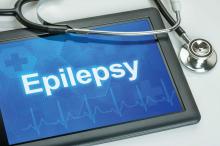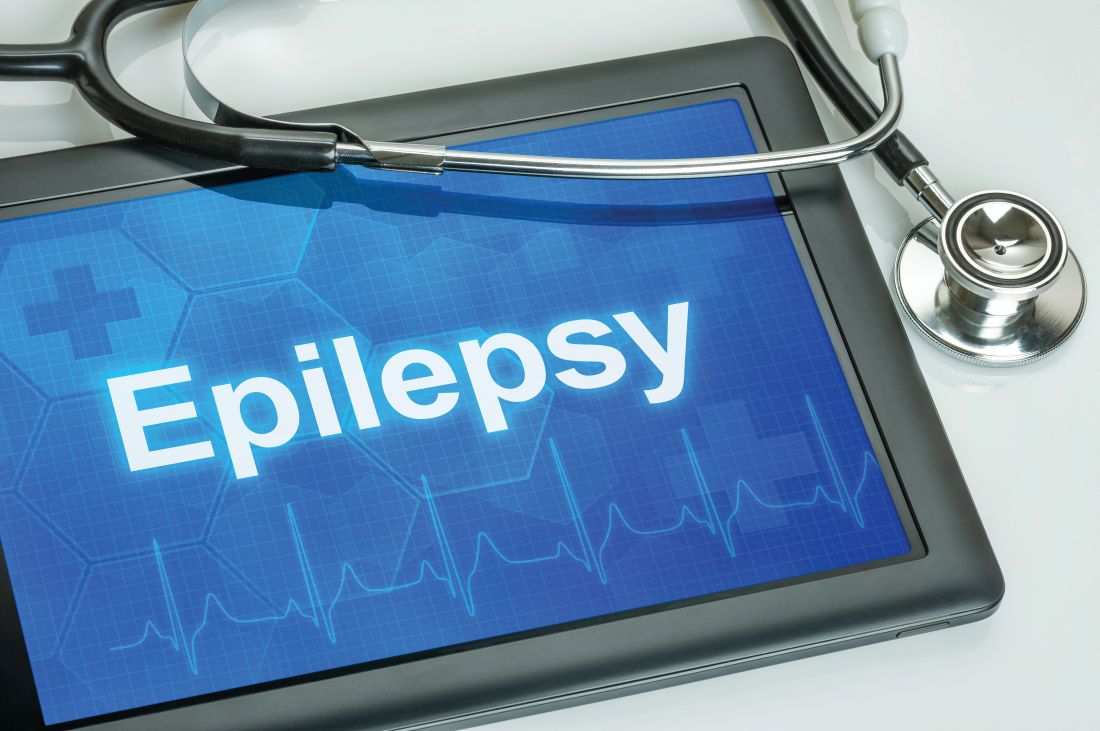User login
according to the results of a large single-center retrospective study.
Such misdiagnoses caused substantial diagnostic delays, increased the risk of cognitive deterioration, and exposed children to inappropriate radiation and invasive procedures, reported Giulia Carbonari and her associates at the University of Bologna, Italy.
Several recent case reports have described pediatric epilepsies that were misdiagnosed and treated as gastrointestinal (GI) disorders. To better frame the problem, the investigators reviewed the medical records of 858 consecutive children with epilepsy treated at their center between 2010 and 2015.
A total of 21 patients (2.4%) were initially misdiagnosed with GI disease. Most were younger than 1 year old. Notably, 7 of 27 children (26%) with West syndrome were misdiagnosed – in six cases with GERD, and in one case with infant colic. In addition, 10 of 24 children (42%) with temporal lobe epilepsy were misdiagnosed with GERD (five cases), recurrent abdominal pain (two cases), or cyclic vomiting, gastric pain, or dysfunctional elimination syndrome (one case each). Finally, 4 of 38 children (11%) with Panayiotopoulos syndrome were misdiagnosed with cyclic vomiting (three cases) or GERD (one case).
Misdiagnoses typically caused at least a 3-month diagnostic delay (interquartile range, 2-18 months), and half of misdiagnosed children received inappropriate abdominal ultrasonography, upper alimentary canal radiography, or esophagogastroduodenoscopy. Eight patients also received inappropriate antireflux therapy, and one patient underwent inappropriate surgery, the researchers said.
They shared tips for avoiding these misdiagnoses. Epileptic spasms of West syndrome involve brief contractions (flexion or extension) of the neck, trunk, and extremities, usually in clusters. Psychomotor slowing also is common. Seizures in temporal lobe epilepsy often involve automatisms, mental status changes, and changes in skin color, blood pressure, and heart rate. Signs of Panayiotopoulos syndrome include emesis, cyanosis, pallor, changes in intestinal motility, gaze deviation, hypotonia, confusion, and unresponsiveness.
“A careful review of a patient’s medical history and a detailed description of paroxysmal episodes are the most important tools to reduce diagnostic errors,” they said.
No funding sources were reported. The researchers reported having no conflicts of interest.
SOURCE: Carbonari G et al. Epilepsy Behav. 2018 Apr 26. doi: 10.1016/j.yebeh.2018.03.034.
according to the results of a large single-center retrospective study.
Such misdiagnoses caused substantial diagnostic delays, increased the risk of cognitive deterioration, and exposed children to inappropriate radiation and invasive procedures, reported Giulia Carbonari and her associates at the University of Bologna, Italy.
Several recent case reports have described pediatric epilepsies that were misdiagnosed and treated as gastrointestinal (GI) disorders. To better frame the problem, the investigators reviewed the medical records of 858 consecutive children with epilepsy treated at their center between 2010 and 2015.
A total of 21 patients (2.4%) were initially misdiagnosed with GI disease. Most were younger than 1 year old. Notably, 7 of 27 children (26%) with West syndrome were misdiagnosed – in six cases with GERD, and in one case with infant colic. In addition, 10 of 24 children (42%) with temporal lobe epilepsy were misdiagnosed with GERD (five cases), recurrent abdominal pain (two cases), or cyclic vomiting, gastric pain, or dysfunctional elimination syndrome (one case each). Finally, 4 of 38 children (11%) with Panayiotopoulos syndrome were misdiagnosed with cyclic vomiting (three cases) or GERD (one case).
Misdiagnoses typically caused at least a 3-month diagnostic delay (interquartile range, 2-18 months), and half of misdiagnosed children received inappropriate abdominal ultrasonography, upper alimentary canal radiography, or esophagogastroduodenoscopy. Eight patients also received inappropriate antireflux therapy, and one patient underwent inappropriate surgery, the researchers said.
They shared tips for avoiding these misdiagnoses. Epileptic spasms of West syndrome involve brief contractions (flexion or extension) of the neck, trunk, and extremities, usually in clusters. Psychomotor slowing also is common. Seizures in temporal lobe epilepsy often involve automatisms, mental status changes, and changes in skin color, blood pressure, and heart rate. Signs of Panayiotopoulos syndrome include emesis, cyanosis, pallor, changes in intestinal motility, gaze deviation, hypotonia, confusion, and unresponsiveness.
“A careful review of a patient’s medical history and a detailed description of paroxysmal episodes are the most important tools to reduce diagnostic errors,” they said.
No funding sources were reported. The researchers reported having no conflicts of interest.
SOURCE: Carbonari G et al. Epilepsy Behav. 2018 Apr 26. doi: 10.1016/j.yebeh.2018.03.034.
according to the results of a large single-center retrospective study.
Such misdiagnoses caused substantial diagnostic delays, increased the risk of cognitive deterioration, and exposed children to inappropriate radiation and invasive procedures, reported Giulia Carbonari and her associates at the University of Bologna, Italy.
Several recent case reports have described pediatric epilepsies that were misdiagnosed and treated as gastrointestinal (GI) disorders. To better frame the problem, the investigators reviewed the medical records of 858 consecutive children with epilepsy treated at their center between 2010 and 2015.
A total of 21 patients (2.4%) were initially misdiagnosed with GI disease. Most were younger than 1 year old. Notably, 7 of 27 children (26%) with West syndrome were misdiagnosed – in six cases with GERD, and in one case with infant colic. In addition, 10 of 24 children (42%) with temporal lobe epilepsy were misdiagnosed with GERD (five cases), recurrent abdominal pain (two cases), or cyclic vomiting, gastric pain, or dysfunctional elimination syndrome (one case each). Finally, 4 of 38 children (11%) with Panayiotopoulos syndrome were misdiagnosed with cyclic vomiting (three cases) or GERD (one case).
Misdiagnoses typically caused at least a 3-month diagnostic delay (interquartile range, 2-18 months), and half of misdiagnosed children received inappropriate abdominal ultrasonography, upper alimentary canal radiography, or esophagogastroduodenoscopy. Eight patients also received inappropriate antireflux therapy, and one patient underwent inappropriate surgery, the researchers said.
They shared tips for avoiding these misdiagnoses. Epileptic spasms of West syndrome involve brief contractions (flexion or extension) of the neck, trunk, and extremities, usually in clusters. Psychomotor slowing also is common. Seizures in temporal lobe epilepsy often involve automatisms, mental status changes, and changes in skin color, blood pressure, and heart rate. Signs of Panayiotopoulos syndrome include emesis, cyanosis, pallor, changes in intestinal motility, gaze deviation, hypotonia, confusion, and unresponsiveness.
“A careful review of a patient’s medical history and a detailed description of paroxysmal episodes are the most important tools to reduce diagnostic errors,” they said.
No funding sources were reported. The researchers reported having no conflicts of interest.
SOURCE: Carbonari G et al. Epilepsy Behav. 2018 Apr 26. doi: 10.1016/j.yebeh.2018.03.034.
FROM EPILEPSY & BEHAVIOR
Key clinical point: Epilepsy is a differential diagnosis for atypical gastroesophageal reflux in younger children.
Major finding: In all, 2.4% children were misdiagnosed with gastrointestinal diseases over a 5-year period.
Study details: Single-center retrospective cohort study of 858 children with epilepsy.
Disclosures: No funding sources were reported. The researchers reported having no conflicts of interest.
Source: Carbonari G et al. Epilepsy Behav. 2018 Apr 26. doi: 10.1016/j.yebeh.2018.03.034.

